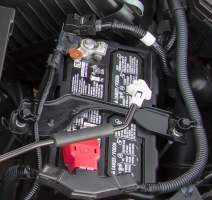— A federal judge dismissed a Honda battery drain lawsuit that alleged Honda Accord and CR-V vehicles were equipped with batteries that suffered from a "parasitic" drain.
The Honda battery drain class action lawsuit alleges 2017-2019 Honda CR-V SUVs and 2016-2019 Honda Accords are equipped with electrical components that don't shut down when the vehicles are shut off.
This allegedly drains the battery, and the plaintiffs claim the battery and other components will prematurely fail.
According to the Honda battery drain lawsuit, the alleged problem existed from the time the Accords and CR-Vs were first sold.
Honda allegedly has not offered a reliable fix for the alleged battery drain issue other than telling dealers to update software and replace dead batteries. The lawsuit says those "repairs" don't fix the battery drain problem, leaving the Accords and CR-Vs worth less than they should be.
The 13 owners who are plaintiffs in the class action lawsuit also allege the CR-V and Accord vehicles are not “safe or reliable” as advertised by Honda.
Honda Battery Drain Lawsuit Dismissed
In its motion to dismiss the class action, Honda argued all the claims fail because the plaintiffs did not plausibly allege the vehicles contain the alleged battery drain defect.
Honda told the judge the class action lawsuit failed to identify the particular parts or systems in the vehicles that are affected by the alleged defect or provide facts showing the alleged defect caused the battery problems and component failures.
According to Honda, the battery drain class action lawsuit failed to provide the automaker with fair notice of the alleged defect.
Honda argued the plaintiffs alleged parasitic draining occured when “electrical components” failed to shut off, but the plaintiffs failed to identify the electrical component or components that failed to shut off which caused the parasitic battery draining.
Honda contends the plaintiffs alleged allege a variety of symptoms without alleging any facts showing the symptoms are consequences of the alleged defect, as opposed to some other cause.
And importantly, Honda told the judge the plaintiffs didn't even allege their own vehicles suffered from any of the alleged battery problems or component failures described in the battery drain lawsuit.
"[T]he allegations are insufficient to raise the inference that the alleged defect causes the identified battery problems and component failures." — Honda
Judge Haywood S. Gilliam, Jr. agreed with Honda by finding the battery drain class action lawsuit "lacks allegations that identify the part or system of the vehicles at issue that is affected by the alleged parasitic draining defect."
The judge also ruled the plaintiffs did not allege any of their vehicles suffered from the alleged battery problems or component failures as a result of the alleged defect.
"[This is so even though Plaintiffs aver that their vehicles contain the alleged defect and that Honda has not adequately repaired or remedied the alleged defect in any affected vehicles, including theirs. Plaintiffs allege only that they experienced unspecified “issues” with their vehicles at unspecified times." — Judge Gilliam
According to the Honda battery drain lawsuit, unidentified people submitted complaints to the government or posted complaints online regarding battery problems they experienced with their vehicles.
But the judge said these allegations "do not raise the inference that the battery problems are attributable to a parasitic draining defect in the vehicles’ electrical systems or any other common component or system."
"The overwhelming majority of the alleged complaints do not associate the battery problems with any cause, much less a common cause." — Judge Gilliam
And while the plaintiffs mentioned communications between Honda and dealerships about batteries, the judge found the battery drain lawsuit lacks allegations that connect these problems to a defective "electrical system."
According to the judge, the Honda communications talk about distinct components or systems that can cause battery problems, including “a software bug in the VSA [Vehicle Stability Assist],” the “PCM [powertrain control module],” and the “FI-ECU,” among other parts or systems.
Although the judge dismissed all the Honda battery drain lawsuit claims, he did grant the plaintiffs the ability to change and refile their Honda class action lawsuit.
The named plaintiffs include: Ronald Raynaldo, Richard Barrie, Andre Cruz, Fernanda Nunes Ferreira, George Jones, Robert Lizzul, Mitchell Bryon Pazanki, John Provenzano, Harry Rapp, Dennis Woods, Dayane Tessinari, Brendan Sanger and Jason Casey.
The Honda battery drain lawsuit was filed in the U.S. District Court for the Northern District of California: Ronald Raynaldo, et al., v. American Honda Motor Co., Inc.
The plaintiff is represented by Kaplan Fox & Kilsheimer LLP, and Kuzyk Law, LLP.

